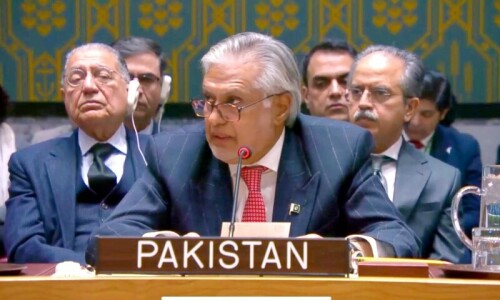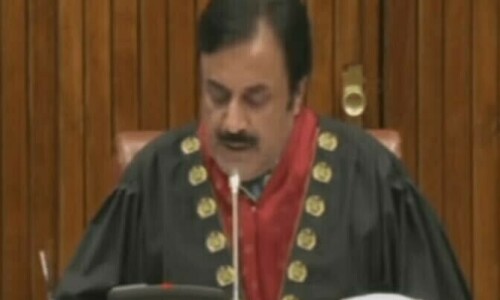ISLAMABAD, May 29: The National Judicial Policy-Making Committee on Saturday asked the government to enforce Small Claims and Minor Offences Ordinance 2002.
Presided over by the Chief Justice of Pakistan, Justice Nazim Hussain Siddiqui, the committee noted that the law to this effect had already been promulgated under which respective provincial governments, in consultation with high courts, had yet to designate courts for the small claims and minor offences.
According to the law, these courts would be manned by the Civil Judge-cum-Judicial Magistrate and would be responsible for quick decisions of small claims where the value of the suit was less than Rs100,000. These courts would also decide minor offences where the punishment prescribed was less than three years of imprisonment.
The small claims and minor offences courts would be established at the District or Tehsil level, to make justice available at the community level. The purpose of the statute is also to provide legal cover to amicable modes of settling disputes between parties, facilitated by the courts. The law is intended to make justice easily and expeditiously available and without having to incur heavy costs.
The national committee also discussed the courts' automation plan under which computers were being provided to the courts in the country. In due course of time, courts in Pakistan would be connected through Internet and would have access to case-law as well as statutory laws.
Cause lists as well as judgments of the courts would also be put on the Internet for the benefit of the litigant parties, lawyers and the general public.
The committee also decided several measures to accelerate the implementation of the courts automation plan.
It also took notice of the issues and problems confronting the system of administration of justice in the country and decided to meet more often to discuss and resolve issues and problems.
During the meeting it was emphasized that the administration of justice and provision of free access to justice was a mandate of the state, being executed through the judicial system of the country. There are problems of delays and accumulation of backlog in the courts and also problems of false and fictitious cases/complaints being filed in courts, which unnecessarily waste the precious time of the courts and results in delay in disposal of cases.
The committee also noted about unnecessary and unreasonable adjournments being sought or given, which hampers the quick disposal of cases, resulting in justice being delayed.
Apart from the chief justice the meeting was also attended by Justice Chaudhry Ejaz Yousaf, Chief Justice Federal Shariat Court, Justice Saiyed Saeed Ashhad, Chief Justice High Court of Sindh, Justice Raja Fayyaz Ahmed, Chief Justice of the Balochistan High Court, Justice Mian Shakirullah Jan, Chief Justice of the Peshawar High Court, Justice Syed Jamshad Ali, judge Lahore High Court and Dr Faqir Hussain, secretary NJPMC.
Meanwhile, another meeting of the governing body of Access to Justice Development Fund was held separately to take a decision with regard to investment of access to justice fund in the government guaranteed Pakistan Investment Bonds to generate and maximize the profit which would be expanded to strengthen the capacity of the subordinate courts, provide amenities to the litigant public and legal aid to the poorer sections of the society.













































Dear visitor, the comments section is undergoing an overhaul and will return soon.